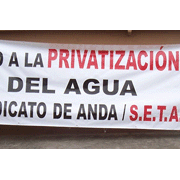
The idea of ‘trade in services’ is an artificial creation of the late 1970s and 1980s, designed to bring the social and public provisioning of services under international trade rules that would work for corporations. The big services corporations of the time – airlines, finance, telecommunications, etc. – developed and promoted the idea as they sought to shape a globalised economy.
They got their way with help from the US Trade Representative and rich countries of the OECD. The US insisted on the negotiation of new set of rules that became part of the World Trade Organisation. The General Agreement on Trade in Services (GATS) entered into force in January 1995. Under the GATS, countries promised to create open-ended markets for their services and keep them open to transnational corporations (TNCs). This meant abandoning support for those who provide services for local or domestic communities for economic or social purposes. The US wanted GATS to go even further and cover all investment, but India and Brazil said no. Instead, the agreement was designed only for the services corporations.
International trade in services is the foreign supply of a service to local users, whether through foreign investment or from across the border. The other form of foreign supply of a service - people travelling to another country to deliver a service - is only considered trade when it involves elites, such as professionals or executives working for TNCs. In theory, temporary migration for remittances also qualifies, but in practice, this is relegated to an immigration issue.
Over time, services have become the largest part of many countries’ economies, and the largest source of employment. The sector is dominated by TNCs that control the infrastructure of finance, communications and transport, and more recently digital technologies, platforms and interfaces. Those TNCs are the beneficiaries of government commitments to liberalise markets, remove restrictions on foreign investment, and adopt light handed regulation in this sector.
Both the GATS and free trade agreements (FTAs) that expand on it impose a fundamental rethink of services. Sanitation, tourism, broadcasting, finance, retail, telecommunications, transport, entertainment, healthcare, education, even lawyers and accountants, are an integral part of people’s daily lives. People don’t think about services as commodities that are bought and sold in markets like a can of sardines. Services are hugely important as relationships, sources of jobs, transmitters of culture, and as public goods that central and local governments provide for their people’s wellbeing. Yet trade in services agreements reduce them to tradeable commodities in lightly regulated markets.
Trade in services agreements generally don’t require countries to privatise their services. The requirement to provide competitive markets that operate on purely commercial, profit-focused criteria, and pressures for governments to reduce the size, capacity and cost of the state, achieves liberalisation anyway. Reducing restrictions on foreign investment, and signing away the rights to give preferences or supports for domestic services suppliers, let the TNCs cash in.
The web of rules and obligations has expanded through bilateral, regional and mega-regional free trade agreements. The positive list approach, which allowed countries some control over their exposure to the rules, has been replaced by negative lists, where governments have to state explicitly what measures or sectors are not covered i.e. liberalised. Negative lists futureproof the rules for the corporations, ensuring that new technologies and services benefit from the rules. FTAs can also limit future options, by imposing a standstill that prevents the adoption of rules that are more restrictive of corporations and a ratchet that automatically locks in any new liberalisation.
Today, new trade deals, such as the US-Mexico-Canada Agreement, the Comprehensive and Progressive Agreement for a Trans-Pacific Partnership and the Canada-EU trade deal, are adding new rules to the mix in the area of digital technologies. These new rules carry different names, as they refer to “e-commerce”, “digital trade” or “digital services”. The most potent are designed to empower big tech corporations to operate globally in an almost regulation-free zone.
Companies, such as Google, Apple, Facebook, Amazon, Microsoft, Alibaba, Uber or Airbnb, make most of their profits from processing personal data and selling algorithm-generated patterns of human behaviour. Trade deals allow them to entrench this data mining model. By accepting thse rules, signatory states from where the data are extracted lose control over the information once the data are exported. They cannot require data to be processed and stored in their own territory either. That means sensitive data about things like personal health can be processed outside the country of origin, removing important safeguards for citizens. In addition, digital trade provisions cut local governments’ revenues by eliminating custom duties on electronic transmissions (e.g. emails, software, digital music or movies); impose the non-disclosure of algorithms and source codes (even when there are security risks); and forbid favouring local digital contents or services.
International people’s campaigns to stop the GATS, the Trade in Services Agreement and various FTAs have been a constant thorn in the side of trade in services negotiations. There have been many successes. Leaked texts broke down the secrecy of negotiations and forced governments to defend themselves. Rich countries were exposed as demanding developing countries open their water and other public services to TNCs. Trade unions mobilised nationally and internationally to defend public services, whether in education, health, local government or the environment. Union confederations of workers in private sectors, such as food, transportation, finance, mining, communications, highlighted the ‘servicification’ of their sectors, bringing them under the corporate trade rules. Anti-poverty campaigners, indigenous Peoples, consumer advocates, health activists, among others, broke down the barriers to entering the ‘trade’ debate. Activists educated themselves so that they could lead debates and force negotiators to defend themselves, and explain to their legislatures what was happening behind their backs.
As corporations keep coming up with new ways to consolidate and expand their grip on our economies, jobs, lives and ecosystem, we need to update our knowledge, rethink our strategies and renew our determination. The COVID-19 pandemic has provided yet another challenge and opportunity to rethink how services such as healthcare, food distribution and transportation can be protected and developed for the benefit of people instead of corporations.
Jane Kelsey, Professor of law, University of Auckland contributed to this text
Photo: Joint Base Elmendorf-Richardson / Public domain
last update: September 2022






